Speaker Bios
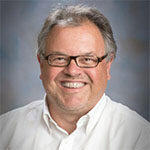
Peter Backlund
Associate Director, CSU School of Global Environmental Sustainability
Peter Backlund is Associate Director of the CSU School of Global Environmental Sustainability and has devoted his career to the planning, management and leadership of complex research organizations. His interests include the relationship of human activities, climate change, and other environmental changes; assessment of climate change impacts, vulnerabilities and response strategies; development and use of information and observational technologies for environmental research and education; use of scientific research for decision-making and public policy; and improving the communication of scientific information to non-technical audiences.
Peter was part of the leadership team of the National Center for Atmospheric Research (NCAR) from 2001-2013, where he led strategic planning and developed a series of interdisciplinary projects that combined atmospheric, social, health, ecological, and hydrological science. Before joining NCAR, Peter was a senior advisor in the White House Office of Science and Technology Policy from 1995-2001 where he focused on climate change science, assessment and policy; evaluation, planning, and coordination of environmental science programs and budgets; and communication of environmental science and technology issues to senior officials, industry, the academic community, the public, and the Congress. He is a fellow of the American Association for the Advancement of Science.
Dr. Backlund helped manage Earth science activities at NASA HQ from 1991-1995, contributing to development of the Earth Observing System (EOS) and other projects with Japan, Germany, Great Britain, France, Italy, India, Brazil, Australia, Canada, Russia, ESA, EUMETSAT, and the United Nations. From 1988-1991, Peter held positions with SM Systems Research Corporation, LRS Associates, and Science Applications International Corporation, where he supported NASA and other agencies.

Edward B. Barbier
University Distinguished Professor, CSU Department of Economics | Senior Scholar, CSU School of Global Environmental Sustainability
Edward B. Barbier is a University Distinguished Professor in the Department of Economics, Colorado State University and a Senior Scholar in the School of Global Environmental Sustainability. His main expertise is environmental and resource economics as well as international environmental policy.
He has consulted for national, international and non-governmental agencies, including many UN organizations, the World Bank and the OECD. Professor Barbier has published widely in leading academic journals and is a highly cited scholar on global environmental and sustainability issues. His latest book is Economics for a Fragile Planet, Cambridge University Press.
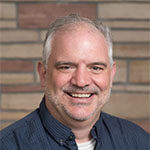
Martín Carcasson, Ph.D.
Professor, CSU Department of Communication Studies | Director, CSU Center for Public Deliberation
Martín Carcasson, Ph.D., is a professor in the Communication Studies department of Colorado State University, and the founder and director of the CSU Center for Public Deliberation (CPD). His interests are focused on rhetoric and contemporary public affairs, and the interdisciplinary theory and practice of deliberative democracy and collaborative governance.
The CPD serves as an impartial resource for the community dedicated to enhancing local democracy in Northern Colorado through improved public communication, community problem solving, and collaborative decision-making. Dr. Carcasson trains students to serve as impartial facilitators, who then work with local governments, school boards, and community organizations to design, facilitate, and report on public forums on important issues.
Dr. Carcasson’s research has been published in Rhetoric & Public Affairs, the International Journal of Conflict Resolution, and the Quarterly Journal of Speech.
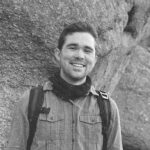
Daniel Dean
Epidemiology PhD Student, CSU Department of Environmental & Radiological Health Sciences
Daniel Dean is an Epidemiology PhD student at CSU’s Department of Environmental & Radiological Health Sciences. His research with advisors Dr. David Rojas and Dr. Brooke Anderson covers health impact assessments of environmental exposures including urban canopy policies, hurricanes, and geoengineering scenarios. His Masters research with Dr. Pankaj Trivedi focused on forest soil microbiomes under climate change, and previous work included working at Dr. Jan Leach’s rice pathology lab, and with the Montana Conservation Corps.
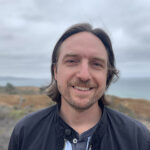
Honoré Depew
Climate Team, City of Fort Collins
Honoré Depew (he, him) has been with the City of Fort Collins since 2015 where he has served in both Sustainability Services and the City Manager’s Office. Since 2021 he has led the Climate Team in the Environmental Services Department, helping to implement the Our Climate Future plan and supporting staff that lead equitable climate engagement, municipal sustainability, adaptation and resilience, and carbon accounting.
Honoré holds a Bachelor of Science in Sustainable Community Development from Portland State University and a Master in Management from Southern Oregon University. He lives in Fort Collins with his partner and two school-age children.
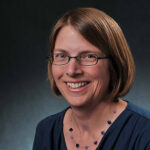
Lisa Dilling
Professor, Environmental Studies Program at University of Colorado Boulder
Lisa Dilling is a Professor in the Environmental Studies program at the University of Colorado Boulder, a Fellow of the Cooperative Institute for Research in Environmental Sciences (CIRES) and former Director of the Western Water Assessment at the University of Colorado Boulder.
She is an interdisciplinary scholar studying how to build climate resilience and accelerate the transition to carbon-free energy. Topics of research include energy, climate adaptation, drought and urban water management, policy for usable science, climate change and public lands, carbon management, geoengineering, and municipal policies regarding climate adaptation and natural hazards.
She has served on numerous national and research advisory boards, three journal editorial boards, a National Academy of Sciences, Engineering and Medicine Committee, and was a Leverhulme Visiting Professor at the University of Oxford in 2016-2017. She holds a Ph.D. from the University of California, Santa Barbara and an B.A. from Harvard College.

Victor Galvan
Strategic Partnership Manager, Protégete
Victor Galvan was born is Chihuahua, Mexico and raised in Denver, Colorado. For the past 15 years Victor has helped shape immigration policy in the state of Colorado. Notable policies include ASSET, which provides instate tuition for undocumented students in Colorado, the expansion of the Colorado Road and Safety Act, giving more undocumented people access to licenses in Colorado and Virginia’s law which made it illegal for police to utilize ICE warrants to hold immigrants in custody for Immigration.
Victor led the walk-outs in 2017 as the Trump administration tried and failed to end the DACA program champions by thousands of undocumented youth across the country and created through executive order under the Obama administration in 2012. He was recently hired as the Strategic Partnership Manager at Protegete and will be building a strong networks and coalitions that will foster the development of Latinxs voices to bring diverse solutions to environmental justice and conservation movement.

Mireille Gonzalez
PhD Candidate, Human Dimensions of Natural Resources Department at CSU
Mireille Gonzalez is a PhD Candidate at Colorado State University in the Human Dimensions of Natural Resources Department. She is on the leadership team for CSU’s Climate Adaptation Partnership (CAP) and is a Senior Associate with the Center for Public Deliberation (CPD).
Her research focuses on identifying drivers and motivators of pro-environmental behaviors and on understanding how to better design and implement stakeholder engagement to integrate diverse perspectives, values, and needs in decision-making to achieve natural resource management objectives. She has plans to conduct research on depolarizing public perspectives toward climate change and implementing engagement processes to foster community-level climate action.
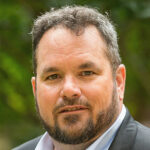
Ned Harvey
Founder & CEO, Digital Gaia
Ned Harvey is a founder and CEO of Digital Gaia, a Colorado-based venture developing an open technology platform for consensus-based, high integrity validation and verification of lifecycle impact from innovation and investment in climate & energy transitions strategies.
Prior to founding Digital Gaia, Ned served as a Managing Director at RMI, leading programs focused on solar market transformation, energy and climate transition strategies in energy-intensive global Industries, and climate intelligence. Ned considers his role at Digital Gaia as the culmination of 33 years of diverse, mission-driven business and leadership experience.
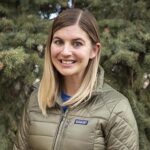
Dr. Caroline (Carrie) Havrilla
Assistant Professor, CSU Department of Forest and Rangeland Stewardship
Dr. Caroline (Carrie) Havrilla (she/her) is an Assistant Professor in the Department of Forest and Rangeland Stewardship at Colorado State University. Dr. Havrilla directs the CSU Dryland Ecology and Management Lab, a team of plant and soil ecologists working on cross-scale ecological questions.
Her research program broadly seeks to understand how biotic interactions, global change, and ecological restoration shape patterns of biodiversity and ecosystem functioning across dryland ecosystems. Dr. Havrilla works closely with stakeholders and rightsholders to co-develop research that supports the development of science-based, climate-adaptive land management strategies, decision-making, and public policy in a changing world.

Duane Highley
CEO, Tri-State Generation and Transmission Association, Inc.
Duane Highley serves as CEO of Tri-State Generation and Transmission Association, a not-for-profit power supply cooperative of 45 members. Tri-State’s 42 electric distribution cooperative and public power district members in four states together deliver reliable, affordable and responsible power to more than a million electricity consumers across nearly 200,000 square miles of the West.
Duane has served the electric cooperative movement for nearly four decades, and currently serves as co-chair of the Electric Subsector Coordinating Council (ESCC), coordinating security efforts between electric utility CEOs and cabinet-level officials of the U.S. Government. Highley serves on the Board of Trustees of the Keystone Policy Center, an independent, not-for-profit organization focused on finding lasting solutions to significant policy issues in energy, environment, education, health and agriculture.
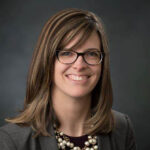
Alice Jackson
Senior Vice President - System Strategy, Xcel Energy
Alice Jackson was recently appointed senior vice president, System Strategy and chief planning officer, leading a new enterprise-wide System Planning organization at Xcel Energy.
Previously, Jackson was area vice president of Strategic Revenue Initiatives, leading the company’s revenue growth strategy. From 2013-2016, she was regional vice president, Rates and Regulatory Affairs, Xcel Energy – Colorado. Jackson joined Xcel Energy in 2011 as regional vice president, Rates and Regulatory Affairs, Xcel Energy – Texas, New Mexico. She has a wealth of experience in managing government and stakeholder relations, as well as developing innovative products and services for customers gained over a 17-year career in the energy industry.
Jackson received a bachelor of science in Management Information Systems from Texas A&M University and completed the Harvard Business School Program for Leadership Development. She serves on the board of directors of the American Red Cross.
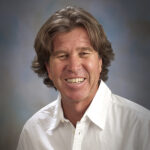
Gene Kelly
Professor of Pedology; Deputy Director of the Colorado Agricultural Experiment Station; Associate Director for Research - CSU School of Global Environmental Sustainability
Gene Kelly is a Professor of Pedology, Deputy Director of the Colorado Agricultural Experiment Station and is Associate Director for Research in the School of Global Environmental Sustainability at Colorado State University (CSU). He was recently on assignment at National Ecological Observation Network (NEON) as visiting head scientist. He received his B.S. and M.S. degrees from Colorado State University and his Ph.D. from the University of California-Berkeley.
Dr. Kelly conducts research and lectures nationally and internationally on various aspects of soils as related to global change issues. His scientific specialization is in Pedology and Geochemistry with primary interests in the biological weathering of soil and studies of soil degradation and global biogeochemical cycles. His current research is centered on Global Soil Degradation and fundamental role of grasslands in global biogeochemical cycles.
He serves as an advisor to the United States Department of Agriculture with the National Cooperative Soil Survey, The National Science Foundation and several major research programs. He is a Fellow of the Soil Science Society of America and is the recipient of the 2016 Soil Science Society of America Research Award.
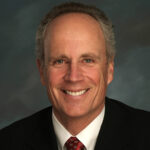
Jim Lochhead
CEO/Manager, Denver Water
Jim Lochhead was appointed Denver Water’s CEO/Manager in 2010. Lochhead also currently serves on the boards of the Association of Metropolitan Water Agencies, the Water Utility Climate Alliance and the Water Foundation.
Prior to Denver Water, Mr. Lochhead was in private law practice, dealing with natural resource issues throughout the United States and internationally. He was also executive director of the Colorado Department of Natural Resources. Mr. Lochhead was the Colorado governor’s representative on interstate Colorado River operations, and served on the Colorado Water Conservation Board, Great Outdoors Colorado, The Nature Conservancy and Colorado Conservation Trust.
In 2014, Lochhead received the Wayne N. Aspinall “Water Leader of the Year” award from the Colorado Water Congress, presented annually to a Coloradan demonstrating courage, dedication, knowledge and leadership in the development, protection and preservation of Colorado water. In 2015, Lochhead received the President’s Award from the Colorado Foundation for Water Education, given to a person doing meaningful work in the field of water. Mr. Lochhead has a bachelor’s degree in environmental biology from the University of Colorado and a law degree from the University of Colorado School of Law.
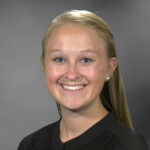
Beth Lunsford
PhD Student, CSU Environmental Health
Beth Lunsford is a PhD student in Environmental Health focusing on community health, environmental justice, and exposure science. She received a BS in environmental engineering from CSU before working professionally on environmental remediation and monitoring projects for the federal government. In 2019, Beth received my Master of Public Health (MPH) from Emory University in Atlanta, Georgia, during which she also worked for University of Georgia’s Extension Services focusing on well water and septic system education.
Before coming to CSU, Lunsford was the outreach education coordinator for the Arizona Department of Environmental Quality for the solid and hazardous waste group. Since joining CSU, she has served as a GTA and is currently the GRA on a community health study for the Globeville and Elyria-Swansea (GES) neighborhoods in Denver, Colorado. This community health study focuses on a cumulative risk assessment over space and time to evaluate health risks from physical, chemical, and social exposures borne by GES residents to understand how multiple exposure pathways culminate in adverse health outcomes.
Her team’s process involves creation of a knowledge exchange framework grounded in principles of community-based participatory research to understand lived knowledge and concerns of community members and for the GES residents to understand the processes of environmental health risk assessment, cumulative risk assessment, mapping, and the biological basis of public health so that we may effectively create tools and outputs that are most useful to the community.
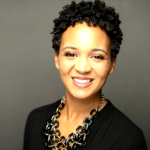
Winna MacLaren
Communications & Engagement, Denver Office of Climate Action, Sustainability and Resiliency
Winna MacLaren leads communications and engagement for Denver’s Office of Climate Action, Sustainability and Resiliency. She is passionate about making Denver a healthier, more inclusive place to live for everyone, and loves sharing the incredible stories of real results. Winna has previously worked in various non-profit and government entities, including Denver Regional Council of Governments, Arapahoe County’s Elections Division and Denver Public Schools.
Winna currently serves as Board Secretary for The Alliance Center and as chair of Colorado’s PRSA Diversity and Inclusion committee. She previously served on Mayor Hancock’s Sustainability Advisory Council, and served as chair of the council’s subcommittee on Equity and Environmental Justice.
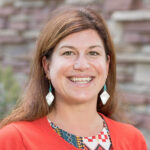
Stephanie Malin
Associate Professor of Sociology, CSU
Stephanie Malin is Associate Professor of Sociology at Colorado State University. Her research interests include environmental justice, health, and governance in extractive communities, as well as communities building more distributive and regenerative systems. She utilizes qualitative fieldwork and mixed methods in rural and marginalized regions in the US and works to build relationships with community partners.
Stephanie is the co-founder and co-director of the Center for Environmental Justice at Colorado State University, where she also teaches undergraduate and graduate courses on these topics. Stephanie has authored a new book, Building Something Better: Environmental Crises and the Promise of Community Change ,with Meghan E. Kallman, and is also the author of The Price of Nuclear Power: Uranium Communities and Environmental Justice. Stephanie conducts public sociology and engaged scholarship, and her work can additionally be found in news outlets like The Conversation and High Country News’ Writers on the Range.
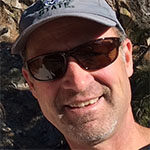
Jeff Muhs
Associate Director, CSU Energy Institute
Jeff Muhs has been an Associate Director at CSU’s Energy Institute since 2016. Prior to joining CSU, Jeff held positions at Witricity Corp., Utah State University, Oak Ridge National Laboratory (ORNL), and in the United States Senate.
Mr. Muhs has secured and managed over $150M in R&D; holds 15 patents, was named a Battelle Distinguished Inventor in 2019 and successfully took three of his inventions from concept-to-commercialization while at ORNL. He won a R&D 100 Award in 2006 and was named ORNL’s 1997 Engineer of the Year and Science Communicator of the year in in 1997 and 2004, respectively. Mr. Muhs has provided congressional testimony to the U.S. Senate Appropriations Committee, and while working in the U.S Senate as an energy and science policy advisor, Jeff drafted several provisions in the Energy Policy Act of 2005, coordinated the Senate S&T Caucus, drafted early legislation leading to the creation of ARPA-E, and helped shape two initiatives announced in President George W. Bush’s 2006 State-of-the-Union Address.
While at WiTricity Corp., Mr. Muhs was responsible for fortifying intellectual property and sublicensing resonance-based wireless power transfer technology to automotive and consumer electronics OEMs. Mr. Muhs sits on the board of the Colorado Cleantech Industry Association, the National Renewable Energy Laboratory / Alliance to Save Energy Science and Technology Committee, and co-directs the Rockies/Plains Energy Accelerator for Commercializing Hard-tech (REACH).

Josie Plaut
Associate Director, CSU Institute for the Built Environment
Josie Plaut is Associate Director for the Institute for the Built Environment at CSU where she guides companies, municipalities and organizations through developing capacity and action plans for sustainability. Josie is a strategic facilitator with a proven track record for guiding teams to realize their visions, goals and strategic priorities and her recent work spans domestic and international clients. She brings a combination of subject matter expertise in sustainability, effective facilitation, and systems thinking, resulting in shared purpose, clarity of vision and engagement from project constituents. Josie is a published and cited author on the topics of sustainability, green building, and regeneration.
Josie is a Patterson Center Certified StratOp Facilitator, a LEED Accredited Professional since 2004, and holds a degree in Sustainable Enterprise from Fort Lewis College and a Masters of Construction Management at CSU. Josie is a founding developer of The LENSES (Living Environments in Natural Social and Economic Systems) Framework, a ground-breaking system for creating transformational change toward regenerative design. Josie is a member of the board of directors of Fastillium Property Group AB and serves on the advisory panel of Valeo Groupe.
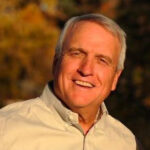
Bill Ritter, Jr.
Founder & Director, CSU Center for the New Energy Economy
Bill Ritter, Jr. is the founder and director of the Center for the New Energy Economy (CNEE) at Colorado State University, which launched on February 1, 2011. Ritter authored a book that was published in 2016 entitled, Powering Forward – What Everyone Should Know About America’s Energy Revolution.
Ritter was elected as Colorado’s 41st governor in 2006 and built consensus to tackle some of the state’s biggest challenges. During his four-year term, Ritter established Colorado as a national and international leader in clean energy, by building a new energy economy. He signed 57 new energy bills into law, including a 30% Renewable Portfolio Standard and a Clean Air Clean Jobs Act that replaced nearly a gigawatt of coal-fired generation with natural gas. In total, the Colorado new energy economy created thousands of new jobs.
Governor Ritter was formerly the chair of the Board of Directors of the Energy Foundation and currently serves on the board of The Climate Group American and the Board of Trustees of The Nature Conservancy. He is a member of Blackhorn Venture Capital and serves as an advisor to Green Alpha and Millennium Bridge, among others. Ritter earned his bachelor’s degree in political science from Colorado State University (1978) and his law degree from the University of Colorado (1981). With his wife Jeannie, he operated a food distribution and nutrition center in Zambia. He served as Denver’s district attorney from 1993 to January 2005.

Russ Schumacher
CSU and Colorado State Climatologist, Colorado Climate Center
Russ Schumacher – Along with his faculty position in the Department of Atmospheric Science at Colorado State University, Dr. Schumacher serves as the Colorado State Climatologist and Director of the Colorado Climate Center. He received his M.S. in 2003 and Ph.D. in 2008 from the Department of Atmospheric Science at Colorado State University.
His research and teaching interests include extreme precipitation, weather systems, the climatology of precipitation, and Colorado’s weather and climate. In 2021, he received the Clarence Leroy Meisinger early-career research award from the American Meteorological Society.
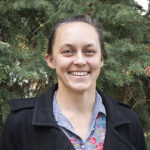
Camille Stevens-Rumann
Fire Ecologist & Faculty Member, CSU Department of Forest and Rangeland Stewardship; Assistant Director, Colorado Forest Restoration Institute
Camille Stevens-Rumann is a fire ecologist & faculty member in the Forest and Rangeland Stewardship department at Colorado State University, as well the Assistant Director of the Colorado Forest Restoration Institute. She started working in fire ecology after being a wildland firefighter and now her research focus is primarily on post-fire recovery including challenges facing disturbed lands, understanding species and ecosystem responses to disturbances, and exploring ways to improve future ecosystem management.
Camille uses a multitude of techniques in her research including observational field surveys, geospatial analyses, and experimental approaches and holds a MS in Forestry from Northern Arizona University and a Ph.D. in Natural Resources from University of Idaho.
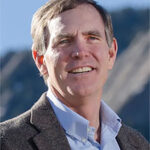
Brad Udall
Senior Water and Climate Research Scientist/Scholar, CSU Colorado Water Institute
Brad Udall has an extensive background in water and climate policy issues, including as Director of the Western Water Assessment (University of Colorado), as the first Director of the Getches-Wilkinson Center for Natural Resources, Energy and the Environment (University of Colorado), and currently as the first senior water and climate research scientist/scholar at the Colorado Water Institute (Colorado State University).
He has written extensively on the impacts of climate change on water resources in the American West. He was the lead author of the water sector chapter of the Global Climate Change Impacts in the United States (2009), a publication of the United States Global Change Research Program and was an author of the Western Water Assessment’s Climate Change in Colorado Report.
He was formerly a consulting engineer and the managing partner at Hydrosphere Resource Consultants. The California Department of Water Resources awarded him its Climate Science Service Award for his work in facilitating interactions between water managers and scientists, and the Department of Interior bestowed the Partner in Conservation Award on the Western Water Assessment for his work on the groundbreaking 2007 EIS on Colorado River shortages and coordinated reservoir operations. He has an engineering degree from Stanford and an MBA from Colorado State University.

Joe von Fischer
Professor of Biology, CSU
Joe von Fischer is a Professor of Biology at Colorado State University in Fort Collins, CO. Joe’s research examines what gives the atmosphere its greenhouse gas composition, and he is best known for developing new technologies for measuring emissions of methane from both natural and human-dominated systems. He was a pioneer in the scientific field of Advanced Leak Detection where, in collaboration with Environmental Defense Fund and Google, his lab developed algorithms to find natural gas leaks in cities from high-sensitivity methane analyzers deployed in Google Street View cars. Between 2012 and 2019, his team mapped natural gas leaks in 16 US cities including New York, Los Angeles and Chicago. His team has published over 10 scientific papers about Advanced Leak Detection technology, including results finding patterns in environmental justice of natural gas leaks.
Joe’s research has been funded by NSF, EDF, NYSEARCH, NASA by companies including Southern Cross, and ConEdison. More recently Prof. von Fischer earned his B.A. from Augustana College in South Dakota, a PhD from Cornell University and conducted post-doctoral research at Princeton.
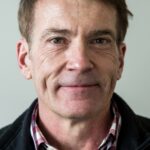
Dr. Bryan Willson
Executive Director, CSU Energy Institute
Dr. Bryan Willson is Executive Director of the Energy Institute at Colorado State University, and the holds the Bryan Willson Presidential Chair of Energy Innovation. He also serves as a Professor of Mechanical Engineering. He served as a Program Director at ARPA-E (Advanced Research Projects Agency – Energy), from 2012-2016 and continues to serve as a consultant / advisor to the agency.
Dr. Willson has worked for over 25 years to develop and deploy large-scale technology solutions related to energy, air quality, and human health. As an entrepreneur, Dr. Willson is co-founder of: Envirofit International, a global company that has developed solutions for clean mobility (direct injection retrofits for 2-stroke cycle engines) and is now manufacturing and distributing clean cookstoves in the developing world; Solix BioSystems, a developer of large-scale production systems for algae-based fuels and specialty chemicals; and Factor(e) Ventures, a venture development firm supporting early stage ventures working on access to energy in the developing world; and Xpower a developer of microgrid technology for the developing world.
In his university role, he has helped to launch or enhance numerous other companies. His research laboratory, the Engines & Energy Conversion Laboratory, has made important contributions in many areas including: internal combustion engines, oil & gas production technology, advanced electrical grids, advanced biofuels, technology for the developing world, and advanced building technologies. Dr. Willson has worked in over 40 countries.
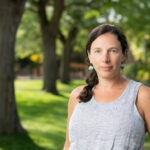
Dr. Jane Zelikova
Executive Director, CSU Soil Carbon Solutions Center
Dr. Jane Zelikova is the executive director of the Soil Carbon Solutions Center at Colorado State University and serves as a science advisor for Carbon Direct. She earned her PhD from the University of Colorado and is an ecosystem scientist working at the intersection of climate change science and policy, most recently focused on scaling carbon dioxide removal.
Jane has worked across the western US and abroad, examining the effects of global change in natural and managed systems. Jane also co-founded 500 Women Scientists and Hey Girl Productions.
